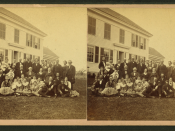Common-interests associations are found in almost every corner of the world, from the most arctic regions of the Russia to the hot, arid deserts of Africa. They are designed for many purposes including interests, beliefs, ideals, helping people cope, promoting people's rights, and etcetera. Throughout history, up until now, common-interest groups have provided people with care, understanding, happiness, comfort, and support. It is partially because of this reason that these groups are replacing portions of the extended family. In addition to diminishing importance of the extended family, modernization is affecting the size of family.
Groups based on common-interest are particularly prominent in modern industrial societies, but are found in many of the world's traditional societies as well. Among these traditional societies are pastoralists who participate in quite a few interest groups. These can come in many forms. An example of this would be among the Tiriki in Kenya. Here, the people are organized into one of seven groupings.
Each group passes successively through four distinctive age grades: Warriors, Elder Warriors, Judicial Elders, and Ritual Elders. Each one of these groups performs certain tasks that correspond to their status. Through recent events, traditional roles have been dropped, and new roles have been assigned to each. This can be seen through the Warriors most prominently; with peace amongst the Tiriki, warriors no longer have to act as guardians, but rather, they may leave their lands to pursue education and employment elsewhere. Meanwhile, Elder Warriors take on the roles of executives, Judicial Elders settle disputes and act as the local judicial body, and Ritual Elders run the initiation ceremonies and are recognized for their power as sorcerers [1]. Among other pastoralist groups, other forms of common-interest groups may develop. In modern times, most pastoralists need some agricultural goods, and if they...



Excellent Essay
This is a very well written essay. Great work.
Possible Improvements: maybe a bit of vocab but nothing besides that
0 out of 0 people found this comment useful.